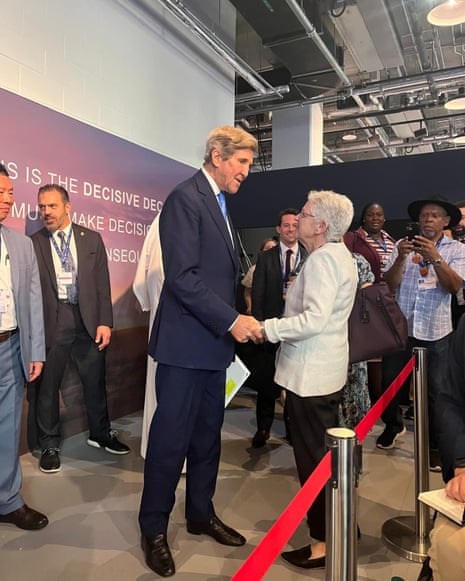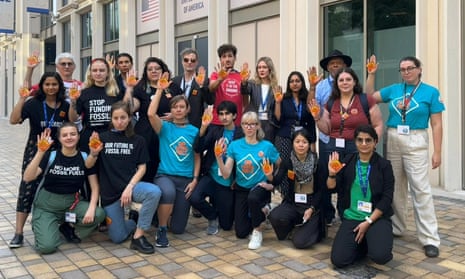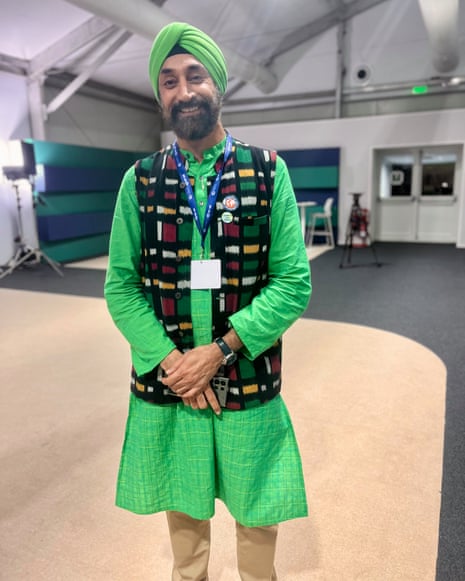22 countries call for tripling of nuclear by 2050
Twenty-two countries have called for a tripling of nuclear energy by 2050 in order to meet net zero goals.
John Kerry, the US’s climate envoy, defended the statement. “We are not making the argument to anybody that this is absolutely going to be a sweeping alternative to every other energy source,” he said.
“But we know because the science and the reality of facts and evidence tell us that you can’t get to net zero 2050 without some nuclear. These are just scientific realities. No politics involved in this, no ideology involved in this.”
However, Bill McKibben’s campaign group 350.org were less enthusiastic. Masayoshi Iyoda, a Japan campaigner at the group, said: “There is no space for dangerous nuclear power to accelerate the decarbonization needed to achieve the Paris climate goal … it is nothing more than a dangerous distraction.
“The attempt of a ‘nuclear renaissance’ led by nuclear industries’ lobbyists since the 2000s has never been successful – it is simply too costly, too risky, too undemocratic, and too time-consuming. We already have cheaper, safer, democratic, and faster solutions to the climate crisis, and they are renewable energy and energy efficiency.”
The signatories to the declaration were: Bulgaria, Canada, Czech Republic, Finland, France, Ghana, Hungary, Japan, Moldova, Mongolia, Morocco, Netherlands, Poland, Romania, Slovakia, Slovenia, South Korea, Sweden, Ukraine, United Arab Emirates, the United Kingdom and the United States.
Key events
Biggest Cop ever
For the first time at a Cop the UNFCCC, which organises the summits, has published the full list of participants in spreadsheet format, making them far easier to analyse.
Carbon Brief have looked at the provisional figures, and found that 84,101 people are registered to attend, 3,074 of whom are attending virtually.
The figures are provisional as more people will have registered than actually attend, but it is close to certain that this will be the biggest Cop ever in terms of number of participants. The final number or attendees will be released after the conference.
For comparison, Cop27 in Sharm el-Sheikh last year hosted just under 50,000 delegates, while Cop1 in Berlin in 1995 only hosted 3,969.
Oliver Milman
John Kerry was up nice and early to help open the US pavilion at Cop28 this morning. The US’s climate envoy led a small group of Biden administration officials in an upbeat assessment of the efforts of the White House in tackling climate change.
“I feel optimistic, I really do,” Kerry said. “I am in Dubai with a sense that something different is really happening.” Kerry pointed to the rapid progress at this Cop of the loss and damage fund, and said that the US has “taken the lead” in spurring the world to increase ambition on emissions cuts, crack down on deforestation and curb methane, a potent greenhouse gas.

A similar message is expected from Kamala Harris, the US vice president, when she speaks here later today. Announcements from the US around coal and methane are expected, too.
Activists who gathered outside the US Center were a bit more sceptical, however. Overt protests aren’t really allowed here but a group of climate campaigners led a chant about phasing out fossil fuels and posed for pictures with slogan stickers stuck to them.

The US is set to break production records for oil and gas this year and is building out a vast network of infrastructure for new gas exports, something that Kerry and his colleagues did not address.
“You can’t talk about reductions when you are talking about more exploration and leasing and drilling,” said John Beard, who was there for Kerry’s speech.
Beard, a former Exxon engineer who now campaigns against the industry’s impacts upon communities along the Gulf of Mexico coast, added: “You can’t talk about decarbonising when you’re recarbonising, it doesn’t make sense. Talk is cheap and sending your big dog officials here isn’t going to do it, it’s action that will do it.”
Nina Lakhani
Harjeet Singh, unofficial winner of best dressed at Cop27, never lowers his standards. As well as being a fashion icon and lovely human being, Harjeet is a climate justice warrior and sharp climate policy analyst.
He is currently the head of global political strategy for the Climate Action Network and global engagement director of the fossil fuel non-proliferation treaty initiative, which is gearing up for a major announcement at 1.30pm GST (9.30am GMT) today

Kyriakos Mitsotakis of Greece is speaking. He says the evidence of the climate crisis has never been clearer, and that the benefits of transitioning to a low-carbon economy had never been clearer.
He speaks of the fires and floods that have devastated the country in recent years, and says Greece has cut coal use by 80% while growing the economy faster than other countries in the Eurozone.
He says the decarbonisation of shipping – in which Greece is a world power – must be done on an even playing field. Shipping is one of the world’s most polluting industries, and has been notoriously resistant to change.
He refers to “protecting ancient monuments from the wrath of climate change” and to “learning from our ancestors”, but does not explicitly mention this week’s row over whether the UK should return the Parthenon marbles to Greece.
Some believed the tie featuring Greek flags worn by King Charles III for his speech yesterday was a subtle signal of support for returning the marbles.
My colleagues Caroline Davies and Helena Smith covered that story here:

Damian Carrington
Our correspondents in Dubai are always on the lookout for the best-dressed delegates to highlight in the blog.

Fanny Chen is from Brazil, and is at Cop28 promoting vegan eating.
“Livestock is the root cause of both Nature’s collapse and the climate crisis,” according to the leaflet she is handing out.
Mia Mottley: “Turn down the methane”
Mia Mottley, prime minister of Barbados and one of the major figures in climate diplomacy, is now speaking at the leaders’ statements section of the conference.
She thanks people for their work so far, but says that the creation of a loss and damage fund is only part of the equation. For every dollar spent on preventing climate-induced disasters, seven dollars is saved, she says.
She says non-state actors – ie fossil fuel companies need to come to the table with money.
“The reality is that unless we change course … we are going to see far more lives lost and far more damage done,” she says.
She singles out action on methane as essential, as it is so much more damaging in the short term than carbon dioxide, and says the world needs strong regulation of oil and gas companies to swiftly reduce methane releases.
“To turn down the heat, you simply have to turn down the methane,” she says.
It is interesting that Mottley spent the majority of her speech, which ran significantly over her allotted three minutes, focusing on methane rather than climate finance, the subject with which she is most associated. More announcements on methane are expected later today.

Patrick Greenfield
There are huge queues to get into Cop28 this morning at what will surely be the largest climate summit by some distance. More than 80,000 people have registered for badges to the event, and many are struggling to get into the venue in Dubai.
Delegates could be heard pleading to get through security this morning, warning that they were missing events and meetings in the Blue Zone where negotiations are held, with waits expected to last up to two hours at the entrance nearest the metro station.
103,000 people registered. This is the queue for the Blue Zone (negotiations, pavilions, side events).
How many need to be here? How we define *need* in the context of governance and the climate crisis? #COP28 pic.twitter.com/qmawmONG9j
— Jen Allan (@JenIrisAllan) December 2, 2023
For those reading this post still in the queue, the good news is that there is another way into Blue Zone. Delegates need to enter via the Green Zone entrance – where there are no queues – and then get into the Blue Zone that way.
Want to end the proliferation of how much time you spend in queues at #COP28 this morning?
Enter via Green zone entrance to south. pic.twitter.com/YpPc5puuuj
— Fossil Fuel Non-Proliferation Treaty Initiative (@fossiltreaty) December 2, 2023
22 countries call for tripling of nuclear by 2050
Twenty-two countries have called for a tripling of nuclear energy by 2050 in order to meet net zero goals.
John Kerry, the US’s climate envoy, defended the statement. “We are not making the argument to anybody that this is absolutely going to be a sweeping alternative to every other energy source,” he said.
“But we know because the science and the reality of facts and evidence tell us that you can’t get to net zero 2050 without some nuclear. These are just scientific realities. No politics involved in this, no ideology involved in this.”
However, Bill McKibben’s campaign group 350.org were less enthusiastic. Masayoshi Iyoda, a Japan campaigner at the group, said: “There is no space for dangerous nuclear power to accelerate the decarbonization needed to achieve the Paris climate goal … it is nothing more than a dangerous distraction.
“The attempt of a ‘nuclear renaissance’ led by nuclear industries’ lobbyists since the 2000s has never been successful – it is simply too costly, too risky, too undemocratic, and too time-consuming. We already have cheaper, safer, democratic, and faster solutions to the climate crisis, and they are renewable energy and energy efficiency.”
The signatories to the declaration were: Bulgaria, Canada, Czech Republic, Finland, France, Ghana, Hungary, Japan, Moldova, Mongolia, Morocco, Netherlands, Poland, Romania, Slovakia, Slovenia, South Korea, Sweden, Ukraine, United Arab Emirates, the United Kingdom and the United States.
Politico has reported on the shadow cast over Cop28 by the war in Gaza. Several leaders used their speeches to draw attention to the conflict, and behind the scenes officials are having meetings with their counterparts about Gaza.
Here’s a sample of Politico’s report:
Israeli president Isaac Herzog spent much of the morning in meetings telling fellow leaders about “how Hamas blatantly violates the ceasefire agreements,” according to a post on his X account. He ended up skipping a speech he was meant to give during Friday’s parade of world leaders.
There were other conspicuous no-shows. Saudi Arabian Crown Prince Mohammed bin Salman was absent, despite being listed as an early speaker. And Mahmoud Abbas, the Palestinian Authority leader, also disappeared from the final speakers’ list after initially being scheduled to talk just a few slots after Herzog.
Then, shortly after leaders posed for a group photo in the Dubai venue on Friday, the Iranian delegation announced it was walking out. The reason, Iran’s energy minister told his country’s official news agency: The “political, biased and irrelevant presence of the fake Zionist regime” — referring to Israel.
Read the full piece here.
Welcome to day three of Cop28
Good morning! This is Alan Evans, bringing you coverage from the third day of the UN’s Cop28 climate summit.
The Guardian will be liveblogging the negotiations throughout. You can email me on [email protected] or on X/Twitter at @itsalanevans, and my colleague Ajit Niranjan ([email protected]) will take over later on.
Today will see more world leaders take to the stage to give speeches. The hosts will hope some of them will use them to make pledges to the newly-agreed loss and damage fund, the creation of which has been the main talking point of the conference so far.
And here’s a summary of the main events yesterday:
-
World leaders, particularly those from developing countries at the forefront of the climate crises, begged large economies and emitters to take urgent action both to reduce emissions and fund loss and damage
-
UK prime minister Rishi Sunak declared to the conference that he had watered down climate policy in the UK, drawing anger from politicians and climate experts who said he had “misread the room”
-
UK opposition leader Keir Starmer accused Sunak of “shrinking and retreating” from showcasing leadership on the global stage at Cop28 and over the climate crisis
-
A new UN report found that droughts are a planetary emergency causing widespread famine, and that they are a silent, often ignored, killer
-
Brazil’s president, Lula, outlined that it is not possible to tackle the climate crisis without also tackling inequality. He spoke of climate suffering in the Amazon, which is experiencing one of the “most tragic droughts in its history” while cyclones in the south of Brazil have left a trail “of destruction and death”.
-
The UK’s King Charles III opened the conference, and warned in his speech that “unless we rapidly repair and restore nature’s economy, based on harmony and balance, which is our ultimate sustainer, our own economy and survivability will be imperilled.”
You can also read our daily news wrap from yesterday here:

